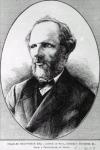Biography
Charles Heavysege (May 2, 1816 - July 14, 1876) was a Canadian poet and dramatist. "He was one of the first serious poets to emerge in Canada, and his play Saul was hailed on its appearance as the greatest verse drama in English since the time of Shakespeare."
Born in Huddersfield, Yorkshire, England, Heavysege emigrated to Montreal in 1853 where he worked as a wood carver. In 1860 he became a reporter for the Montreal Transcript, and later for the Montreal Daily Witness, where he eventually became city editor.
As a poet, Heavysege was mainly influenced by John Milton" Shakespeare" and the Bible." His first published work was The revolt of Tartarus, a poem in six parts, published in two editions: one under his own name in London in 1852, and a second, heavily edited and published anonymously in Montreal, in 1855.
He published Sonnets in 1855, Saul: a drama in three parts in 1857, Count Filippo; or, the unequal marriage in 1860, The Owl (an imitation of Poe's "The Raven") and The Huntsman in 1864, The Advocate (a prose work) and Jephthah?s daughter in 1865, and Jezebel in 1867.
During his lifetime, Saul was Heavysege's best-known work. Nathaniel Hawthorne passed on a copy to the North British Review, where it was given a laudatory (unsigned) review by Coventry Patmore, who called it "indubitably the best poem ever written out of Great Britain." That was followed by further favorable reviews in the Atlantic Monthly, Galaxy, and New York Evening Post. Saul was published in two further editions, in 1859 (also in Montreal) and 1869 (in Boston). (The Boston edition was reprinted in 1876 and again in 1967.) Other admirers of Saul were Canadian Prime Minister Sir John A. Macdonald and American poet Henry Wadsworth Longfellow.
Highly regarded in the 1860s and 1870s, Heavysege "was one of the first of the Anglo-Canadian poets to achieve international recognition; he paved the way for later poets such as






